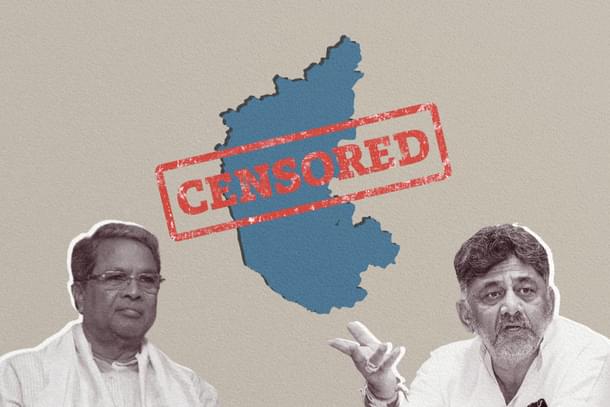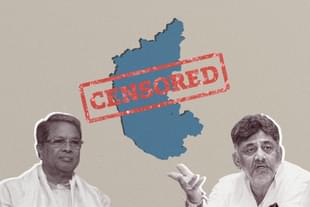Karnataka
Karnataka’s Speech Crackdown: The Truth, The Whole Truth, Or Just The State’s Truth?
Rhea Rao
Jul 02, 2025, 06:26 PM | Updated 06:27 PM IST
Save & read from anywhere!
Bookmark stories for easy access on any device or the Swarajya app.


The Karnataka Government, in a move that's raising more eyebrows than a new flyover project, has proposed a cinematic masterpiece titled "The Great Social Media Clampdown of 2025" with two new draft Bills: 'The Karnataka Misinformation and Fake News (Prohibition) Bill, 2025' and 'The Karnataka Hate Speech and Hate Crimes (Prevention and Control) Bill, 2025'.
These drafts, currently under cabinet scrutiny, await their entrance into the Legislature.
The official narrative? Existing legal measures are totally ineffective, like a dial-up modem in the age of fibre optics, when it comes to combating the fake news and hate speech.
The proposed legislation aims to police social media content, striving for factual accuracy and clamping down on abusive and obscene material, including anti-feminist content. A peculiar directive also intends to outlaw content deemed disrespectful to Sanatan symbols and beliefs.
This legislative intensity emerged in the aftermath of heightened communal tensions in Coastal Karnataka in 2023, which reportedly escalated following the killing of a Bajrang Dal member.
A fact-finding committee, which was the brainchild of the Karnataka Pradesh Congress Committee (KPCC), conveniently identified hate speech by youth and religious leaders, alongside the pervasive circulation of fake news on social media, as the culprits.
Accordingly, these bills are presented as the logical "consequence" of this committee's findings.
The Bill: A Legislative Comedy of Errors, or a Calculated Chess Move?
'The Karnataka Misinformation and Fake News (Prohibition) Bill, 2025' has the definition of "fake news" so expansive, it could encompass a misquoted WhatsApp forward from your aunt or a slightly exaggerated anecdote about Bengaluru traffic.
It includes misquotation or the false report of one's statement, editing audio or video which results in the distortion of facts or the context, or purely fabricated content.
"Misinformation," while excluding satire and opinion, hinges on what a "reasonable person" would perceive as factual. In a nation where 'reasonable' is often as subjective as judging the spiciest biryani, this clause is an open invitation for interpretive anarchy. Because nothing says "modern governance" like vaguely defined ideological policing.
Offences are cognisable and non-bailable. Imagine a viral meme, initially meant as a joke, landing you seven years in prison and a ₹10 lakh fine. Suddenly, every social media user becomes a reluctant tightrope walker over a legal hole.
The bill proposes a six-member Fake News on Social Media Regulatory Authority, bizarrely headed by the Minister for Kannada & Culture. One might ponder why the Ministry of Electronics and Information Technology, the actual overseer of digital domain expertise, isn't leading this tech-heavy movement. It's akin to asking a classical dancer to conduct a rock concert: commendable enthusiasm, but questionable competence.
This choice suggests a perception of fake news as merely a cultural misstep rather than a complex digital phenomenon.
This Authority wields immense power that can impose a complete ban on fake news, abusive content, anti-feminist material, and even content that disrespects Sanatan symbols and beliefs or promotes superstition.
The penalisation of "disrespect to Sanatan symbols" is particularly revealing. In the heated political climate of Coastal Karnataka, where communal rhetoric is daily bread, this inclusion could be a clever political stratagem.
It could potentially shield the State Government from criticism of the Bill by aligning with a narrative that resonates with a specific voter base, effectively turning a shield into a sword.
The requirement that permitted content be based on authentic research in fields like history and philosophy is equally problematic. Who defines "authentic" when historical interpretations are constantly debated, or philosophical truths are subjective?
This provision risks turning social media into a State-sanctioned echo chamber, a digital Durbar where only the state government's narrative is deemed 'authentic'.
'The Karnataka Hate Speech and Hate Crime (Prevention and Control) Bill, 2025', though seemingly less draconian, has its own set of red flags.
While some categories of hate speech are already penalised, the bill grants District Magistrates a proactive power to issue written orders prohibiting any act they believe is likely to create fear, intimidation and ill-will. These orders can last up to 60 days.
This bestows immense, subjective power upon local authorities, potentially enabling them to suppress legitimate protests or dissent simply by declaring them "likely" to cause unrest. It's a classic case of preventative policing that would most likely morph into political suppression.
A Storm on the Horizon: Judicial Scrutiny and Intermediary Woes
Legally, the Misinformation and Fake News Bill is unlikely to survive judicial scrutiny under Article 19(1)(a) of the Constitution. The vague definitions and classifications of permitted content will likely fail the Supreme Court's "proximate link" test established in Shreya Singhal v. Union of India.
The "arrest first, question later" approach and the direct cognisance by Special Courts are procedural shortcuts that undermine fundamental rights to liberty and fair trial. It's a legal framework that appears more designed for expediency than equity.
Furthermore, these bills place an onerous burden on intermediaries, essentially deputising them as "content police".
The complete prohibition of fake news and severe penalties will undoubtedly lead to over-censorship, transforming platforms into cautious gatekeepers. This privatises censorship, eroding the safe harbour principle meant to protect intermediaries and ultimately chilling online speech.
Imagine a scenario where a social media platform, fearing legal repercussions, deletes your innocent biryani recipe video just because someone, somewhere, might misinterpret it as 'promoting gluttony' or 'disrespecting dietary beliefs'.
The creation of a state-level fact-check unit, mirroring the centre's attempt via PIB which was stayed by the Bombay High Court, suggests a pattern of legislative overreach. It is highly probable that the Karnataka Government's version will meet a similar fate in the judiciary.
In sum, these bills, while ostensibly aimed at curbing digital ills, appear to be a blunt instrument wielded by a government seeking greater control over online narratives.
The disproportionate penalties, the politicised composition of the regulatory authority, and the broad, subjective powers granted to officials raise serious concerns about due process, independence, and the potential for political weaponisation of the law.
Drawing from Supreme Court precedents, these bills, in their current form, are likely to be struck down for imposing unreasonable restrictions on fundamental rights. The Congress government's digital clean-up might just end up being a major legislative self-goal.
Rhea Rao is a lawyer practicing at the Supreme Court and a political commentator. She tweets at @_BRRao_.





